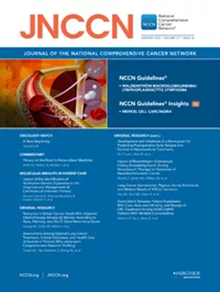NCCN Guidelines® Insights: Management of Immunotherapy-Related Toxicities, Version 2.2024.
IF 14.8
2区 医学
Q1 ONCOLOGY
Journal of the National Comprehensive Cancer Network
Pub Date : 2024-11-01
DOI:10.6004/jnccn.2024.0057
引用次数: 0
Abstract
The NCCN Guidelines for the Management of Immunotherapy-Related Toxicities are intended to provide oncology practitioners with guidance on how to manage the wide-ranging and potentially fatal toxicities that may occur with cancer immunotherapy. The guidelines address immune-related adverse events related to immune checkpoint inhibitors, CAR T-cell therapies, and lymphocyte engagers (which include T-cell-engaging bispecific antibodies). These NCCN Guidelines Insights highlight recent guideline updates pertaining to the management of emerging toxicities related to cancer immunotherapy.
NCCN Guidelines® Insights:免疫疗法相关毒性管理》,2.2024 版。
NCCN 《免疫疗法相关毒性管理指南》旨在为肿瘤医生提供指导,帮助他们管理癌症免疫疗法可能出现的各种潜在致命毒性。该指南针对与免疫检查点抑制剂、CAR T 细胞疗法和淋巴细胞激活剂(包括 T 细胞激活双特异性抗体)相关的免疫相关不良事件。这些 "NCCN 指南透视 "重点介绍了与癌症免疫疗法相关的新发毒性管理有关的最新指南更新。
本文章由计算机程序翻译,如有差异,请以英文原文为准。
求助全文
约1分钟内获得全文
求助全文
来源期刊
CiteScore
20.20
自引率
0.00%
发文量
388
审稿时长
4-8 weeks
期刊介绍:
JNCCN—Journal of the National Comprehensive Cancer Network is a peer-reviewed medical journal read by over 25,000 oncologists and cancer care professionals nationwide. This indexed publication delivers the latest insights into best clinical practices, oncology health services research, and translational medicine. Notably, JNCCN provides updates on the NCCN Clinical Practice Guidelines in Oncology® (NCCN Guidelines®), review articles elaborating on guideline recommendations, health services research, and case reports that spotlight molecular insights in patient care.
Guided by its vision, JNCCN seeks to advance the mission of NCCN by serving as the primary resource for information on NCCN Guidelines®, innovation in translational medicine, and scientific studies related to oncology health services research. This encompasses quality care and value, bioethics, comparative and cost effectiveness, public policy, and interventional research on supportive care and survivorship.
JNCCN boasts indexing by prominent databases such as MEDLINE/PubMed, Chemical Abstracts, Embase, EmCare, and Scopus, reinforcing its standing as a reputable source for comprehensive information in the field of oncology.

 求助内容:
求助内容: 应助结果提醒方式:
应助结果提醒方式:


